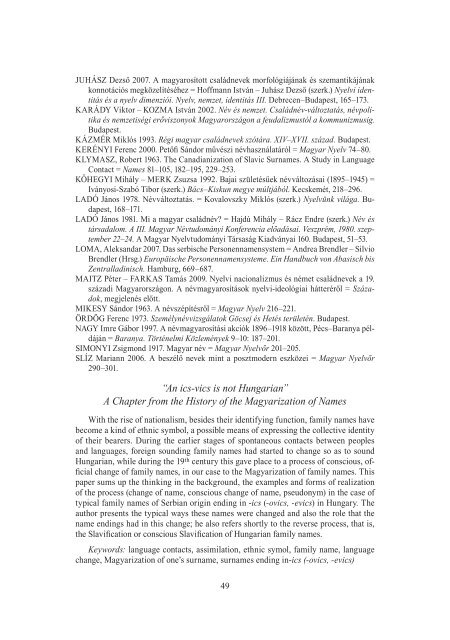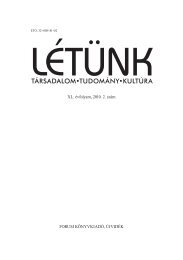Create successful ePaper yourself
Turn your PDF publications into a flip-book with our unique Google optimized e-Paper software.
JUHÁSZ Dezső 2007. A magyarosított családnevek morfológiájának és szemantikájának<br />
konnotációs megközelítéséhez = Hoffmann István – Juhász Dezső (szerk.) Nyelvi identitás<br />
és a nyelv dimenziói. Nyelv, nemzet, identitás III. Debrecen–Budapest, 165–173.<br />
KARÁDY Viktor – KOZMA István 2002. Név és nemzet. Családnév-változtatás, névpolitika<br />
és nemzetiségi erőviszonyok Magyarországon a feudalizmustól a kommunizmusig.<br />
Budapest.<br />
KÁZMÉR Miklós 1993. Régi magyar családnevek szótára. XIV–XVII. század. Budapest.<br />
KERÉNYI Ferenc 2000. Petőfi Sándor művészi névhasználatáról = Magyar Nyelv 74–80.<br />
KLYMASZ, Robert 1963. The Canadianization of Slavic Surnames. A Study in Language<br />
Contact = Names 81–105, 182–195, 229–253.<br />
KŐHEGYI Mihály – MERK Zsuzsa 1992. Bajai születésűek névváltozásai (1895–1945) =<br />
Iványosi-Szabó Tibor (szerk.) Bács–Kiskun megye múltjából. Kecskemét, 218–296.<br />
LADÓ János 1978. Névváltoztatás. = Kovalovszky Miklós (szerk.) Nyelvünk világa. Budapest,<br />
168–171.<br />
LADÓ János 1981. Mi a magyar családnév? = Hajdú Mihály – Rácz Endre (szerk.) Név és<br />
társadalom. A III. Magyar Név tu dományi Konferencia előadásai. Veszprém, 1980. szeptember<br />
22–24. A Magyar Nyelvtudományi Társaság Kiadványai 160. Budapest, 51–53.<br />
LOMA, Aleksandar 2007. Das serbische Personennamensystem = Andrea Brendler – Silvio<br />
Brendler (Hrsg.) Europäische Personennamensysteme. Ein Handbuch von Abasisch bis<br />
Zentralladinisch. Hamburg, 669–687.<br />
MAITZ Péter – FARKAS Tamás 2009. Nyelvi nacionalizmus és német családnevek a 19.<br />
századi Magyarországon. A névmagyarosítások nyelvi-ideológiai hátteréről = Századok,<br />
megjelenés előtt.<br />
MIKESY Sándor 1963. A névszépítésről = Magyar Nyelv 216–221.<br />
ÖRDÖG Ferenc 1973. Személynévvizsgálatok Göcsej és Hetés területén. Budapest.<br />
NAGY Imre Gábor 1997. A névmagyarosítási akciók 1896–1918 között, Pécs–Baranya példáján<br />
= Baranya. Történelmi Közlemények 9–10: 187–201.<br />
SIMONYI Zsigmond 1917. Magyar név = Magyar Nyelvőr 201–205.<br />
SLÍZ Mariann 2006. A beszélő nevek mint a posztmodern eszközei = Magyar Nyelvőr<br />
290–301.<br />
“An ics-vics is not Hungarian”<br />
A Chapter from the History of the Magyarization of Names<br />
With the rise of nationalism, besides their identifying function, family names have<br />
become a kind of ethnic symbol, a possible means of expressing the collective identity<br />
of their bearers. During the earlier stages of spontaneous contacts between peoples<br />
and languages, foreign sounding family names had started to change so as to sound<br />
Hungarian, while during the 19 th century this gave place to a process of conscious, official<br />
change of family names, in our case to the Magyarization of family names. This<br />
paper sums up the thinking in the background, the examples and forms of realization<br />
of the process (change of name, conscious change of name, pseudonym) in the case of<br />
typical family names of Serbian origin ending in -ics (-ovics, -evics) in Hungary. The<br />
author presents the typical ways these names were changed and also the role that the<br />
name endings had in this change; he also refers shortly to the reverse process, that is,<br />
the Slavification or conscious Slavification of Hungarian family names.<br />
Keywords: language contacts, assimilation, ethnic symol, family name, language<br />
change, Magyarization of one’s surname, surnames ending in-ics (-ovics, -evics)<br />
49



